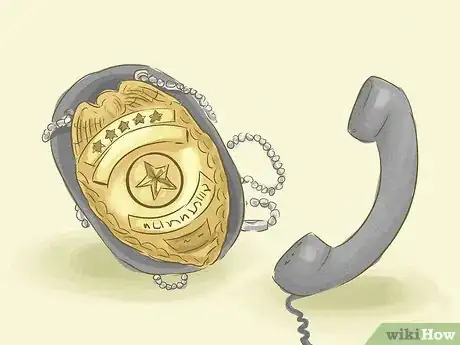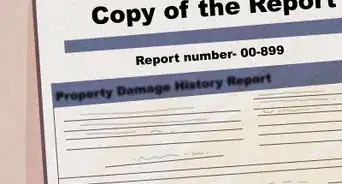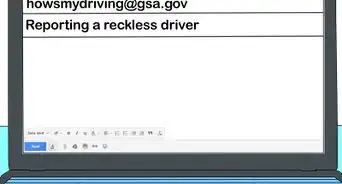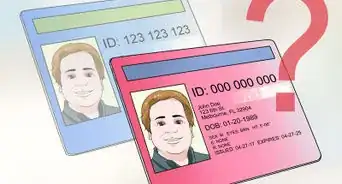This article was co-authored by Clinton M. Sandvick, JD, PhD. Clinton M. Sandvick worked as a civil litigator in California for over 7 years. He received his JD from the University of Wisconsin-Madison in 1998 and his PhD in American History from the University of Oregon in 2013.
There are 8 references cited in this article, which can be found at the bottom of the page.
This article has been viewed 129,276 times.
There are two different motivations behind reporting insurance fraud. The first is turning in an insurance company, an insurance agent, or an independent claims adjuster for an act of fraud against consumers. The other is turning in a consumer for fraudulent action against an insurance company or government insurance organization. Depending on the type of insurance and fraud involved, the proper reporting steps can differ. By knowing who to contact for your individual case, you can report insurance fraud.
Steps
Reporting Insurance Fraud
-
1Learn the importance of reporting insurance fraud. Every uncaught instance of insurance fraud translates into higher premiums down the road for consumers. Even when you are not directly the victim of the fraudulent activity, it can still mean more money out of your pocket in higher premiums when you go to renew your policy. Each time that insurance companies and proper authorities can stop fraudulent activity, it can save you money in the long run. This means that each and every consumer has a vested interest in reporting insurance fraud.
-
2Gather as much information as possible. Building insurance fraud cases requires time and money for official agencies dedicated to investigating the activities. The more information you can provide them to substantiate your claim, the better. Collect all of the appropriate documents, names, dates, and other pertinent information available to you, and have the information on hand when you report the fraudulent activity. Agencies are very busy and are more likely to take your report seriously if you have the proper documentation.Advertisement
-
3Call your insurance company. If you think you have been the victim of insurance fraud, start by calling your insurance company. Most insurance companies have internal, anti-fraud departments available to look into insurance agents and claims adjusters suspected of fraudulent activities.[1] This step can also help you clear up any transcription errors or other clerical missteps that may have appeared as fraud.
- Have as much documentation related to the claim or policy as you can when you call in order to help isolate the source of the fraudulent activity or filing error.
- Even if you aren’t the direct victim of the fraudulent behavior, you can still report it to the necessary insurance company. If, for instance, you know that someone is defrauding a particular insurance company, you can still contact the company’s anti-fraud department, and they will begin an internal investigation of the respective claim or policy.[2]
-
4Contact the National Insurance Crime Bureau (NICB). The NICB is a non-profit organization dedicated to combating insurance fraud across a variety of industries by working closely with insurance companies and law enforcement.[3] [4] You can reach the NICB at (800) 835-6422, or you can also use this online reporting tool.[5]
- Regardless of how you report the activity, options for anonymous reporting are available.[6]
-
5Call your state’s insurance fraud bureau. Each state also has its own government-funded insurance fraud bureau. If you’d prefer to reach out to them directly rather than through a non-profit such as the NICB, these bureaus welcome citizen calls and tips.[7] These departments handle everything from prevention to detection and investigation of suspected fraudulent activity.[8]
-
6Report Medicare fraud. Insurance fraud related to Medicare can be especially costly to taxpayers. The U.S. Department of Health and Human Services (HHS) has a specific process for insurance fraud cases pertaining to Medicare. You can report these instances to the HHS Office of the Inspector General at (800) 447-8477 or to the Center for Medicare and Medicaid Services at (800) 633-4227.
-
7Contact the USDA’s Office of the Inspector General for crop insurance fraud. Your state’s insurance fraud bureau can always help funnel you to the appropriate entity, but if you know for a fact that you’re dealing with a case of crop insurance fraud, then you can also contact the USDA directly.
- You can reach the Office of the Inspector General for the USDA at (800) 424-9121 or by email at usda_hotline@oig.usda.gov.
-
8Contact law enforcement. Other agencies will always take the investigation of fraudulent activities more seriously if law enforcement get involved. Your local law enforcement agency may have a fraud division. Some instances of insurance fraud, especially those in the healthcare industry, may even follow under the jurisdiction of the FBI. You can contact the FBI field office closest to you to determine if your specific case falls under their jurisdiction.[11]
Identifying Common Forms of Insurance Fraud
-
1Learn what constitutes insurance fraud. Anyone involved in the insurance process can commit insurance fraud whether it be the insurance company, the agent selling the policy, an insurance claims adjuster, or even the consumer. In the widest scope of the meaning, insurance fraud is when one of those people or entities intentionally deceives another for illegitimate gain. It can happen anywhere in the insurance process pipeline from buying and using insurance to the acts of selling and underwriting the policies.
-
2Understand the effects of insurance fraud. The FBI estimates that the total costs of insurance fraud exceed $40 billion each year.[12] Most of these costs are past along to consumers because insurance companies have to raise premiums on all policies in order to cover the losses incurred by fraudulent activity.
- The FBI has calculated that this costs the typical U.S. household an additional $400 to $700 in increased premiums every year.[13]
-
3Learn the types of premium diversion. One of the most common forms of insurance fraud, premium diversion is when insurance premiums are embezzled.[14] Typically, premium diversion happens when an insurance agent collects premiums for personal gain without passing them along to the policy underwriter.[15] This means the consumer believes he or she is paying the monthly premium without realizing that the money has been diverted.
- Another form of premium diversion comes when an unlicensed individual sells fake policies and collects the premiums without any intention of ever paying claims.[16]
- Beware of policies with significantly lower rates than any other competitors since this is a tactic used to draw in consumers.
-
4Identify forms of consumer insurance fraud. Consumer insurance fraud comes in a wide array of activities simply because of the different varieties of insurance available to consumers. Most people picture the intentional staging of accidents, injuries, arson, thefts, or other losses covered by a policy. While these instances absolutely constitute insurance fraud, other less-extreme examples include:
- Exaggerating a legitimate claim for personal gain, such as the extent of an injury to claim disability.
- Deliberately providing false information or leaving out true information on a policy application, such as lying about a terminal illness on a life insurance application.
- Whether the insurance is medical, life, disability, auto, homeowners, or even crop insurance for farmers, you can find examples of these various types of consumer insurance fraud across the whole spectrum of insurance types available.
-
5Identify forms of claims adjuster fraud. Claims adjusters review insurance claims on behalf of companies or individuals to determine that actual liability of the insurance company on a given claim. Fraudulent adjusters can collect a fee to review your claim without any intention of following up, refer your repairs to unlicensed or poor contractors, and falsify or inflate claims that go against your insurance policy.[17] Each of these examples constitutes insurance fraud.
- While consumer fraud most commonly defrauds the actual insurance company, adjuster fraud can cost consumers, insurance companies, or both.
Expert Q&A
-
QuestionWhat if there are fraudulent claims made in my name?
 Barzin Barry Sabahat, JDBarry Sabahat, Esq. has been practicing law in California since 1993. He received his JD from Western State University College of Law in 1992. His current practice is based in the San Francisco Bay Area and focuses on Estate Planning, Transactional Law and drunk driving cases.
Barzin Barry Sabahat, JDBarry Sabahat, Esq. has been practicing law in California since 1993. He received his JD from Western State University College of Law in 1992. His current practice is based in the San Francisco Bay Area and focuses on Estate Planning, Transactional Law and drunk driving cases.
Attorney at Law Try contacting your insurance agent first. Most insurance companies have a protocol for dealing with insurance fraud. Your insurance agent will be able to handle your problem or will direct you to a person who can help. Make sure that you write down everything that has happened, so that you have a reliable record to guide you through the process.
Try contacting your insurance agent first. Most insurance companies have a protocol for dealing with insurance fraud. Your insurance agent will be able to handle your problem or will direct you to a person who can help. Make sure that you write down everything that has happened, so that you have a reliable record to guide you through the process. -
QuestionIs it fraud when someone is on long term disability insurance and working making money at the same time?
 Barzin Barry Sabahat, JDBarry Sabahat, Esq. has been practicing law in California since 1993. He received his JD from Western State University College of Law in 1992. His current practice is based in the San Francisco Bay Area and focuses on Estate Planning, Transactional Law and drunk driving cases.
Barzin Barry Sabahat, JDBarry Sabahat, Esq. has been practicing law in California since 1993. He received his JD from Western State University College of Law in 1992. His current practice is based in the San Francisco Bay Area and focuses on Estate Planning, Transactional Law and drunk driving cases.
Attorney at Law It depends on the policy. Most disability policies provide that you are not considered to be back to work unless if you are working a job that is similar to what you were doing when you became disabled. As a result, you will not be considered to be employed unless if its the same type of job. However, the real determining factor is what the insurance policy states. If you are in doubt, call your agent and ask him or her.
It depends on the policy. Most disability policies provide that you are not considered to be back to work unless if you are working a job that is similar to what you were doing when you became disabled. As a result, you will not be considered to be employed unless if its the same type of job. However, the real determining factor is what the insurance policy states. If you are in doubt, call your agent and ask him or her.
References
- ↑ http://www.nhcaa.org/resources/health-care-anti-fraud-resources/private-health-care-fraud-contacts.aspx
- ↑ https://www.statefarm.com/claims/report-insurance-fraud
- ↑ https://www.nicb.org/about-nicb/our_story
- ↑ https://www.fbi.gov/stats-services/publications/insurance-fraud
- ↑ https://www.nicb.org/about-nicb/report-fraud
- ↑ https://www.nicb.org/about-nicb/report-fraud
- ↑ http://www.insurancefraud.org/fraud-bureaus-directory.htm#.VaF-5JNViko
- ↑ http://www.insurancefraud.org/fraud-bureaus-directory.htm#.VaF-5JNViko
- ↑ http://www.insurancefraud.org/fraud-bureaus-directory.htm#.VaF-5JNViko
- ↑ https://oig.hhs.gov/fraud/report-fraud/
- ↑ https://www.fbi.gov/stats-services/publications/insurance-fraud
- ↑ https://www.fbi.gov/stats-services/publications/insurance-fraud
- ↑ https://www.fbi.gov/stats-services/publications/insurance-fraud
- ↑ https://www.fbi.gov/stats-services/publications/insurance-fraud
- ↑ https://www.fbi.gov/stats-services/publications/insurance-fraud
- ↑ https://www.fbi.gov/stats-services/publications/insurance-fraud
- ↑ http://www.insurancefraud.org/scam-alerts-contractors.htm#.VaGItpNViko
About This Article
Insurance fraud is when any party directly involved in the insurance deceives another party to make or save money. To report insurance fraud, call the company directly and tell them you need to report insurance fraud. You can do this even if you’re not the victim of the fraud yourself. Give them as much information as you can to help them resolve the issue, such as names, dates, and documents relevant to the case. Alternatively, call the National Insurance Crime Bureau or your state’s insurance fraud bureau. To report Medicare fraud, call the US Department of Health and Human services. This can even earn you a reward. For more tips from our Legal co-author, including how to report crop insurance fraud, read on!











































































